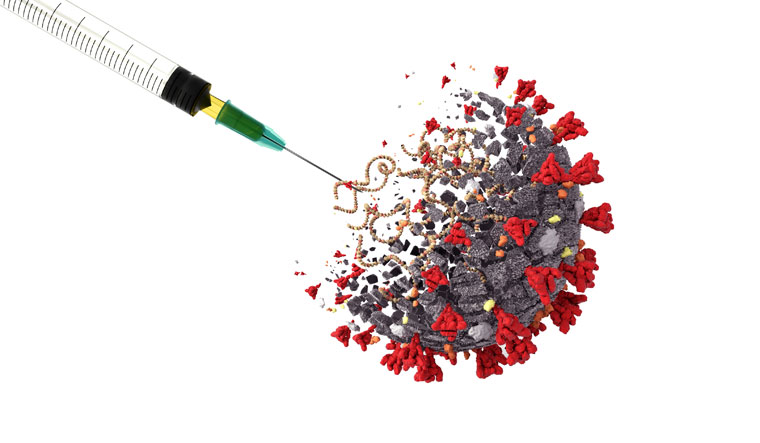The Phase II human clinical trials of the Oxford-Astrazeneca COVID-19 vaccine candidate in India, by Pune-based Serum Institute of India (SII), will begin today. The observer-blind, randomised controlled study to determine the safety and immunogenicity of 'Covishield' on healthy Indian adults will begin at Bharati Vidyapeeth Medical College and Hospital in Pune.
Serum Institute of India has partnered with British-Swedish pharma company AstraZeneca for manufacturing the COVID-19 vaccine candidate, developed by the University of Oxford.
Vaccine testing is a four-stage process—pre-clinical testing on animals; phase I clinical testing on a small group of people to determine its safety and to learn more about the immune response it provokes; phase II trials, or expanded safety trials, where dosage and frequency will be tested across wider cross-sections of the population; phase III large-scale tests where the vaccine is administered to thousands of people to confirm its efficacy. Phase I and phase II are the early trials, which will then be followed by a rigorous, intensive Phase III clinical testing, where the longevity of the vaccine response (whether the vaccine will last for long periods of time) will be analysed.
As a rapid regulatory response, the Drugs Controller General of India (DCGI) on August 3 had given nod to the Serum Institute of India (SII) for conducting Phase II and III human clinical trials of the Oxford COVID-19 vaccine candidate in the country. The trials are to be conducted across 17 selected sites, including AIIMS Delhi. Around 1,600 people aged above 18 years are likely to participate in the trials.
Initial results of the first two phases of trials of the vaccine conducted in five trial sites in the UK showed it has an acceptable safety profile and homologous boosting increased antibody responses.
There were reports that the Oxford vaccine would be capped at a price of Rs 225 per dose in India. However, Dr Vinod K. Paul, member of NITI Aayog, said it was still too early for a price to be fixed, as the issue was being discussed with manufacturers.
Timeline of launch
Union Health Minister Dr Harsh Vardhan on Monday said that if everything goes well, India will get a vaccine against the novel coronavirus by the end of 2020. Adar Poonawalla, the CEO of SII, in conversation with THE WEEK, had said that it will take around two years for the vaccine to be administered countrywide, and that the company will make one billion doses over the next one year for India and other low- and middle-income countries.
Which are the main vaccine candidates under contention in India?
Three COVID-19 vaccine candidates, including two indigenous ones, are in different phases of development in India.
The Phase I human clinical trials of the two COVID-19 vaccine candidates developed indigenously by Bharat Biotech, in collaboration with the Indian Council of Medical Research (ICMR) and Zydus Cadila Ltd, have been completed and the trials have moved to Phase II, ICMR Director General Bhargava had said at a press briefing recently.
Biological E Ltd has entered into an agreement with Janssen Pharmaceutica NV, part of pharma major Johnson&Johnson, for creation and enhancement of production capabilities to manufacture the latter's COVID-19 vaccine.
In collaboration with HDT Biotech Corporation, USA, Gennova has developed an mRNA vaccine candidate (HGCO19), with demonstrated safety, immunogenicity, neutralisation antibody activity in rodent and non-human primate models. It is likely to go to clinical trial before the year-end.
What is the status of the major international candidates?
The Oxford-Astrazeneca vaccine is the most advanced among all its peers, and it is well into the large-scale final phase trials globally.
The Moderna vaccine candidate, also in the third phase trials, was recently found to have protected mice from infection with SARS-CoV-2, the virus that causes COVID-19. The vaccine, known as mRNA-1273 prepared by the US biotechnology company and NIH, contains no actual, attenuated virus; rather, it is an mRNA vaccine. Those shots contain the genetic code for the aptly named spike protein that coats the surface of the coronavirus and gives it the signature shape. That is, Moderna's mRNA-1273 candidate is encoded with the mRNA (messenger RNA, which consists a genetic code) instructions for the coronavirus’s signature spike protein. Thus, human cells create the foreign protein, alerting the immune system, and help the body recognise the entry of the virus in all its forms. The mRNA vaccine is easier to make, but it is a new and unproven technology.
Pfizer and German BioNTech have developed an mRNA vaccine BNT162b1, which is currently in the second phase of testing. According to a recent study, the vaccine elicited a "robust immune response" in participants, and antibodies against SARS-CoV-2 were present 21 days after a single vaccination at all dose levels. Researchers said BNT162b1 was generally well-tolerated, although some participants experienced mild to moderate side effects, which increased with dose level, in the seven days following vaccination, including pain at the injection site, fatigue, headache, fever and sleep disturbance.
-Inputs from agencies


